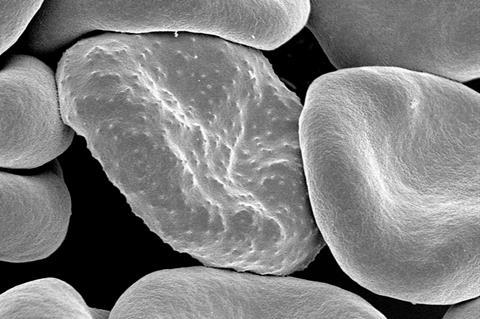Girolline, a compound extracted from the sea sponge Pseudaxinyssa cantharella, has been investigated for possible antitumor effects and also found to have anti-malarial effects. Now, thanks to work by scientists from the RIKEN Center for Sustainable Resource Science, researchers have a better idea of how it works. In addition to its possible medicinal properties, the current findings suggest that the compound could also be useful as a chemical probe for research in areas such as aging and mitochondrial health.

Girolline is one of a number of compounds with biological functions that were isolated from Pseudaxinyssa cantharella. Sea sponges are important sources of biological compounds, since they are unable to move autonomously, and have to protect themselves through chemical means.
It was initially thought that girolline’s possible antitumor effect was due to its being a general translation inhibitor, meaning that it prevented the translation of messenger RNA into the amino acid sequence of proteins by ribosomes, the cell’s protein production factories. However, there was little subsequent exploration of its effects and the mechanisms behind them. In the current work, published in Nature Communications, the scientists used new techniques to gain a greater understanding of how girolline works.
New mechanism of action
According to Tilman Schneider-Poetsch of the RIKEN Center for Sustainable Resource Science, the corresponding author of the paper, “Through our work, we were able to discover that girolline acts by a new mechanism of action. It is the first small molecule that has been found to directly modulate the function of an important protein synthesis factor. And it works selectively on certain amino acid sequences, rather than as a general inhibitor of translation from RNA to proteins.”
READ MORE: Deep sea sponges yield new bacterial strains that may battle pathogens
READ MORE: Three compounds from sea sponge and marine bacteria offer Covid-blocking powers
Essentially, what they discovered is that girolline acts by modulating the activity of eIF5A, a translation elongation factor that helps the ribosome navigate difficult to translate amino acid sequence stretches. When the speed of the ribosome slows, eIF5A binds and enhances the rate of amino acid incorporation, preventing the ribosomes from stalling. Girolline prevents eIF5A from binding to the ribosome. Without the aid of eIF5A the ribosome will get stuck on certain sequence stretches. The stalled ribosomes are then attacked by the ribosome-associated quality control (RQC) pathway, which degrades the protein that is under production. This premature degradation of unfinished proteins appears to account, to some extent, for girolline’s toxicity.
Stall sequences
The sequences that cause stalling include those coding the amino acids proline and lysine, especially when lysine is encoded by the RNA sequence AAA (three adenine bases in a row).
This finding should have implications for the compound’s effect on malaria, because messenger RNA molecules of Plasmodium falciparum, the parasite that causes malaria, tend to have stretches with many adenine bases, making them sensitive to the effects of girolline.
As eIF5A is known to play a role in maintaining the function of mitochondria and its dysfunction has been implicated in the aging process, girolline is also expected to provide a useful chemical tool for dissecting eIF5A’s function in mitochondrial maintenance and aging.
According to Schneider-Poetsch. “Girolline, because of its selectivity, is a new tool that we will be able to use to investigate the role of eIF5A, an important protein involved in aging, neurodegeneration and cancer. We are currently carrying out follow-up projects to investigate this.”




No comments yet